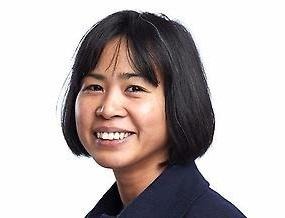Researcher of the Month - Joy Torgé
Researcher of the month for December is Joy Torgé, Senior Lecturer in Gerontology.
Who are you?

My name is Joy Torgé and I was born and raised in Quezon City near Manila in the Philippines. I came to Sweden in 2005 when I got an Erasmus Mundus scholarship for a Master in Applied Ethics. I wanted to stay in Sweden after my studies, so I continued with a Master in Health and Society while at the same time taking courses in Swedish language. After that, I got a position as a doctoral candidate, and I finished my Ph.D. in Ageing and later life in 2014. Today, I feel both Swedish and Filipino. I enjoy the many possibilities of outdoor activities that Swedish nature can offer.
What led you to join JU?
After taking my Ph.D., I worked part-time as a lecturer and research assistant at different universities, but I wanted to get back to research on Social gerontology. Social gerontology deals with how ageing and older people are understood from a societal perspective. I found a job opening for the position of senior lecturer at the Institute for Gerontology (IFG) at Jönköping University. I immediately saw myself in the job description, and I thought: I have to have this job!
IFG is a multidisciplinary environment where I can contribute with my piece of the jigsaw. The job also gives me an opportunity to combine research with teaching.
What is your research about?
Two areas that I have continued working on since my dissertation are informal care – that is, the support given to older people by their relatives – and ageing with disabilities. Right now, I am involved in two research projects. The first project is about the co-habitation guarantee in nursing homes (Sw. parboendegaranti) and its consequences for older couples’ lives. How does everyday life look like for couples that have moved to a nursing home together, when the accompanying spouse is in relatively good health? How is the care responsibility negotiated between the spouse and the staff, and how does the accompanying spouse’s situation look like?
The second project is about people 65 years and older that have a severe mental illness. In my part of the project, we study the kinds of support given to this group by volunteer organizations focusing on mental health. We are also trying to map the different kinds of support that older people with severe mental illness receive from society, for example to what extent family and relatives provide help.
What is the best thing about conducting research at JU?
I like the work environment here and I have nice colleagues. In our research group ARN-J (Aging Research Network – Jönköping), we have a mentor programme for new researchers, which has been very valuable for me. We also arrange regular seminars where you can share ongoing analyses as well as drafts of manuscripts. I think it says something positive about the work environment, when a group feels comfortable to try their thoughts and to present unfinished ideas in front of other researchers.
What are your plans for the future?
The two research projects I mentioned runs until the end of 2018, so right now I am busy working with those. But of course, analysis brings up new questions and perspectives that might be a start for future project applications. The only thing I know for sure right now is that I would like to collaborate with other researchers in my field in the future, maybe in the form of an anthology or a joint project application.
